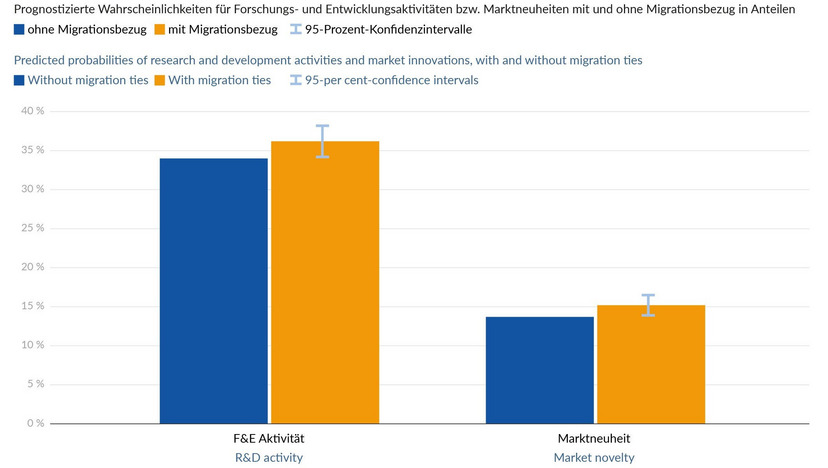The analysis is based on data from the IAB/ZEW Start-up Panel. Established in 2008 it surveys around 6,000 new businesses per year. The panel shows that the proportion of start-ups with at least one person with migration ties more than doubled between 2005 and 2022 from 8 to 19 percent. One in five new businesses in Germany now has a founder with a migration background, which underlines the great entrepreneurial potential of people with migration ties.

© ImagesRouges - stock.adobe.com
How founders with migration ties shape the economy – and what barriers they must overcome
Founders with migration ties are an underestimated driver of innovation in Germany. The Bertelsmann study Entrepreneurship and innovation among founders with migration ties in Germany, conducted by the Leibniz Centre for European Economic Research (ZEW), shows that founders with migration ties are not only particularly innovative, but that their companies also have great growth potential. At the same time, they face disproportionate difficulties in accessing finance. This slows their development and thus the contribution they could make to overall economic dynamics in Germany.
Migration-related start-up dynamics are growing – and remain underestimated
More innovation despite structural disadvantages
Start-ups with a migration focus are particularly innovative: Compared to other young companies, they are 14 percent more likely to launch globally innovative products or services. They are also more willing to engage in research and development.
However, this innovation potential cannot be fully realized, mostly due to difficulties in accessing external financing. Approximately one in five start-ups with migration ties reports problems raising capital – significantly more than companies without migration ties.
Access to financing is the greatest challenge
Compared to other founders, people with migration ties are significantly more likely to rely on bootstrapping – using their own savings - or support from family and friends. Access to traditional bank loans is difficult – even with comparable qualifications, industry, and entrepreneurial experience. This points to implicit barriers that could negatively impact equal opportunity in the financial system.
The share of total venture capital financing is somewhat higher among start-ups with migration ties than among other companies. However, despite their high potential they cannot benefit to a greater extent from government support. Targeted financing programs could remedy this situation, as could more cooperation with migrant founder networks and the reduction of language and bureaucratic barriers.
Diverse motives and resilience
Entrepreneurs with migration ties are far from being primarily motivated by economic hardship. While they frequently cite "better earning opportunities" as motivation for founding a business, strategic motives such as "self-determined work" or "business growth" also play a key role.
They often display resilience and entrepreneurial vision. Many are internationally active and intercultural in composition, about one in three teams with migration ties is founded in collaboration with German co-founders. Cultural diversity tends to be a strength.
No differences in growth – but potentials untapped
Despite the challenges mentioned, start-ups with migration ties are developing just as dynamically in terms of revenue and employment as start-ups without migration ties. However, their higher innovation performance does not lead to greater economic success. This suggests that existing structures limit the potentials of start-ups with migration ties, confirmed by Shamila Borchers of the Migrant Accelerator: "This study shows in black and white what many migrant founders experience every day: Talent alone is not enough – structures are needed that truly enable access and participation."
Recommendations to actively promote diversity
The study clearly shows: The entrepreneurial contribution of people with migration ties is significant for Germany’s innovation and competition capacity, which must be promoted by politics, business and civil society.
- Reduce financing barriers: Banks and investors must be made aware of the structural barriers entrepreneurs with migration ties face. Establishing trust-based financial relationships – such as through referrals from diversity-focused contact points – can be a key factor here.
- Make funding programs more inclusive: Public start-up funding should explicitly address founding teams and businesses with migration ties – through low-threshold information, i.e. through migrant networks, or multi-lingual advisory services.
- Make entrepreneurial diversity visible: The public perception of start-up success continues to be shaped by stereotypes. Visibility and recognition of successful founders with migration ties fosters role models and public narratives.
- Strengthening intercultural teams: Mixed founding teams combine diverse perspectives and increase the resilience and innovation capacity of young companies. Networks and programs that promote exchange across borders deserve special support.
Outlook
Start-ups with migration ties are a valuable component of the German innovation system. They combine diversity with dynamism – and enrich Germany as attractive business environment. To realize their full potential, founders with migration ties need tailored support, fair financing conditions, and public and political recognition of their achievements. Our study provides a sound data basis for action and shows ways how Germany’s startup ecosystem can become inclusive and sustainable.
Results in detail
Please download our bilingual report. This report is part of the Entrepreneurial Potential area, where we explore drivers and barriers for inclusive entrepreneurship and finish with recommendations how make the German start-up ecosystem more supportive of diversity – and thus more vibrant. Also available in English: the Female Founders Monitor 2025.





